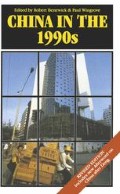Abstract
The introduction of market reforms since 1978 has brought about far-reaching changes not only in China’s economy but also in the nature and structure of society. Decollectivisation, the Open Policy and the growth of a private economy have given birth to new socioeconomic groups such as rich farmers, private traders, private entrepreneurs and Chinese managers in foreign-invested enterprises. The structure of society in post-Mao China has become more stratified, differentiated and complex. The mechanisms and institutions of social control have become out-of-synch with these rapid social changes. The reforms have created a space for new institutional forms of association such as private entrepreneurs’ associations, literary societies and professional associations and even stamp clubs. These ‘social organisations’ have mushroomed rapidly, particularly in the coastal provinces.
Preview
Unable to display preview. Download preview PDF.
Editor information
Editors and Affiliations
Copyright information
© 1995 Jude Howell
About this chapter
Cite this chapter
Howell, J. (1995). Civil Society. In: Benewick, R., Wingrove, P. (eds) China in the 1990s. Palgrave, London. https://doi.org/10.1007/978-1-349-24063-0_7
Download citation
DOI: https://doi.org/10.1007/978-1-349-24063-0_7
Publisher Name: Palgrave, London
Print ISBN: 978-0-333-60138-9
Online ISBN: 978-1-349-24063-0
eBook Packages: Palgrave Political & Intern. Studies CollectionPolitical Science and International Studies (R0)

